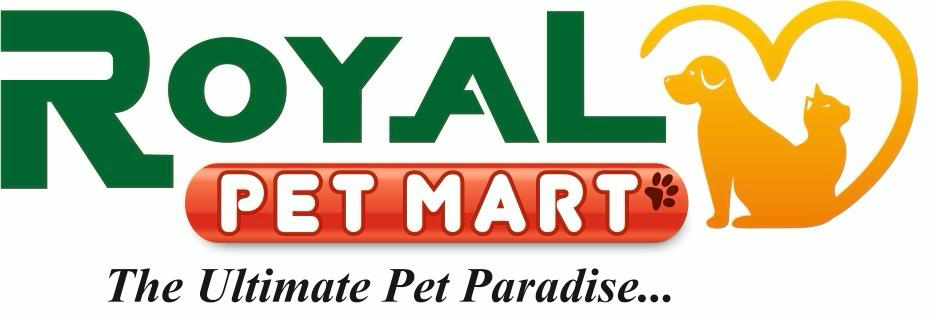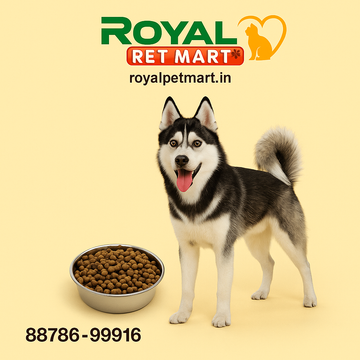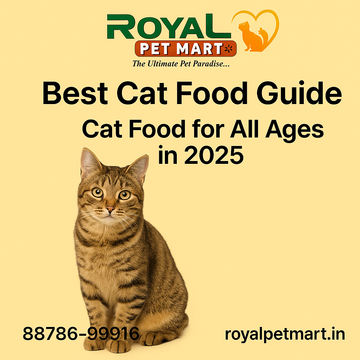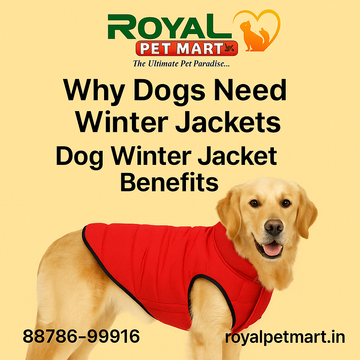Veg Dog Food: Can Your Dog Thrive on a Plant-Based Diet?
by Royal Pet mart on Apr 30, 2025

Introduction
I’ve always been fascinated by the rise of plant-based diets, especially since I switched to a vegetarian lifestyle a few years ago. When I adopted my dog, Milo, I started wondering if he could join me on this journey. Lately, I’ve noticed more and more people talking about dog plant based diet options, with vegetarian and vegan dog foods popping up on shelves and online stores like RoyalPetMart. It’s exciting to see this shift, but it also left me with a big question: is a dog vegan diet truly healthy and safe for Milo, or is it just a trend? In this blog, I’ll share my exploration into whether dogs can eat a vegan diet, drawing from my experiences, research, and conversations with my vet. Let’s dive in and figure out what’s best for our furry friends!
Can Dogs Eat a Plant-Based Diet?
When I began looking into a plant based dog diet for Milo, first I needed to understand his biology. I learned that dogs weren't strict carnivores like cats - they are more like omnivores and their digestion is developed for both meat and plant matter. My vet explained to me that wolves, the ancestral lineage of dogs, were purely meat eaters. However, dogs have existed with humans for so long now, that dogs have adapted to digest and utilize carbohydrates and veggies from their nutrition. This gave me hope that dogs on a vegan diet might work.
I dug into research to see what science says. Studies, like those I found through vet resources, suggest some dogs can adapt to a vegan dog food benefits plan if it’s carefully balanced. Unlike cats, who need high levels of certain nutrients only found in meat, dogs can get what they need from plants with the right formulation. Still, I wondered if dogs thrive off of one food like this, and my vet cautioned that it’s not a one-size-fits-all solution. It’s been a learning curve, but I’m starting to see how Milo’s needs align with this possibility.
Key Nutrients Dogs Need (and How Plant-Based Diets Meet Them)
Switching Milo to a dog plant based diet meant I had to get serious about his nutrition. Dogs need essential proteins and amino acids like taurine and L-carnitine for heart and muscle health. I was worried about this at first, but my vet assured me these can come from vegetable protein for dogs sources like peas, lentils, and soy if the food is well-made. I found a brand on RoyalPetMart that fortifies its vegetarian dog food options with these nutrients, and Milo’s energy levels stayed strong.
Vitamins and minerals are just as critical. Vitamin B12, which is typically found in meat, is a concern, but some plant-based dog nutrition formulas add it synthetically—something I double-checked on the label. Calcium and phosphorus for bone health can come from plants like kale or fortified ingredients, and I’ve seen Milo’s coat stay shiny with the right balance. Common plant-based protein sources like lentils and chickpeas are staples in these diets, and I’ve learned to look for foods that combine them effectively to meet dog dietary needs.
Pros of Feeding Your Dog a Veg Diet
I’ve discovered some real upsides to putting Milo on a dog vegan diet. One big win is potential allergy relief. Milo used to scratch a lot, and my vet suspected it was from chicken in his old food. Switching to a plant based dog diet with no meat proteins eased his symptoms, which felt like a relief. I’ve heard from other dog owners that can dogs eat plant based meat alternatives helped their pets too, avoiding common allergens.
The environmental and ethical benefits also resonate with me. A sustainable dog food option reduces the carbon footprint of meat production, and knowing Milo’s meals align with my values makes me happy. Plus, the availability of balanced commercial vegetarian dog food options has grown—RoyalPetMart has a solid selection, from kibble to wet food, making it easier to find something Milo enjoys. It’s been a positive shift for both of us.
Risks and Challenges of Plant-Based Dog Food
But it’s not all smooth sailing. I’ve learned there are risks with dogs on a vegan diet that I can’t ignore. One big worry is nutritional deficiencies. If the food isn’t properly formulated, Milo could miss out on taurine or B12, which could affect his heart or energy over time. My vet warned me about this, and I’ve seen online discussions about dogs struggling when owners DIY these diets without expertise.
Digestive issues and palatability are challenges too. Milo took a while to adjust to the new flavors, and I had to mix in his old food at first. Some vegan pet food safety concerns popped up when I read about dogs rejecting plant-based meals, which can lead to weight loss if they don’t eat enough. That’s why vet supervision and proper formulation are so important—I rely on my vet’s guidance and stick to AAFCO-compliant options to keep Milo safe and healthy.
How to Choose the Right Veg Dog Food
Picking the right dog plant based diet for Milo has been a process of trial and error. I always look for brands that are AAFCO-compliant, ensuring they’re complete and balanced for dog dietary needs. This was a tip from my vet, and I’ve found several options on RoyalPetMart that meet this standard, giving me confidence in their quality.
I prioritize formulas that are specifically designed as vegetarian dog food options, not just regular food marketed as vegan. I watch for signs Milo is thriving—his energy, coat condition, and stool quality are my gauges. If he seems sluggish or his coat dulls, I know it’s time to adjust. My vet also checks his blood work regularly to ensure his plant-based dog nutrition is on track, which has been a lifesaver for peace of mind.
Transitioning Your Dog to a Plant-Based Diet Safely
Switching Milo to a can dogs eat a vegan diet plan wasn’t instant—I had to do it gradually. I started by mixing a small amount of vegan dog food benefits food with his old kibble, about 25% new to 75% old, and increased it over two weeks. This prevented upset stomachs, which I’d read can happen with sudden changes. By the end, he was fully on the new diet, and his tummy adjusted well.
I keep a close eye on his energy levels and coat condition during the transition. Milo’s coat stayed shiny, and his playfulness didn’t dip, which was a good sign. Regular vet check-ups and blood work are non-negotiable—I schedule them every six months to monitor this is a vegan diet good for dogs' status. It’s been a team effort with my vet, and RoyalPetMart’s variety has made finding the right food easier as we go.
Conclusion
My journey with Milo has shown me that some dogs can thrive on a dog plant based diet if it’s properly managed. The potential for allergy relief and the ethical perks of a sustainable dog food option have been rewarding, but it’s not without challenges like the risk of deficiencies. Choosing the right vegetarian dog food options and working closely with my vet has made all the difference.
Each dog is different—Milo's doing well, but what is working for him may not work for another dog. That's why I can't say it enough—consult your vet to develop a dog's vegan diet catered to your dog! RoyalPetMart has a lot to offer, but now that it's the right thing to do, and at a right cost, you can make a difference to your family member's health in the future. Let’s find the perfect path for your dog together!




